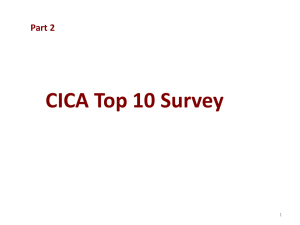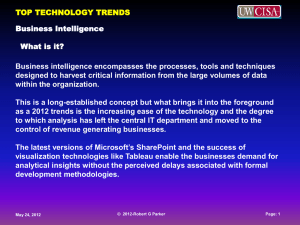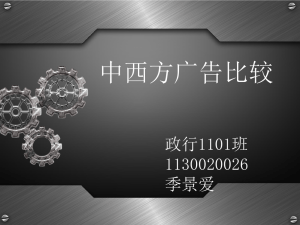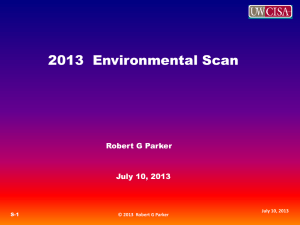Syllabus
advertisement
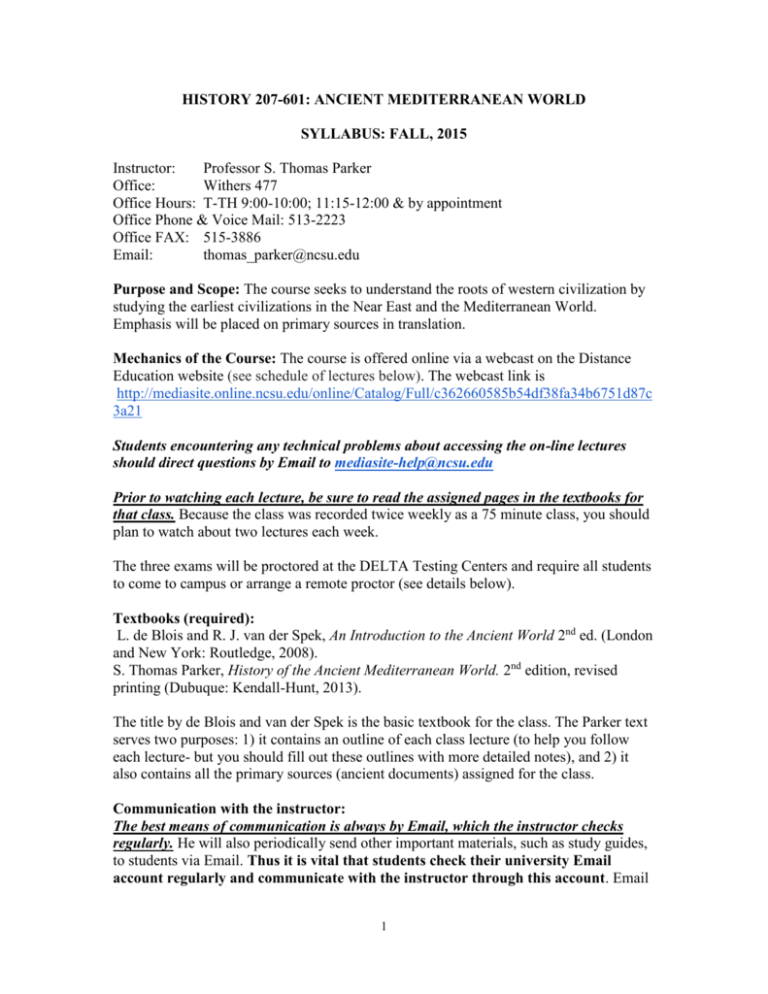
HISTORY 207-601: ANCIENT MEDITERRANEAN WORLD SYLLABUS: FALL, 2015 Instructor: Professor S. Thomas Parker Office: Withers 477 Office Hours: T-TH 9:00-10:00; 11:15-12:00 & by appointment Office Phone & Voice Mail: 513-2223 Office FAX: 515-3886 Email: thomas_parker@ncsu.edu Purpose and Scope: The course seeks to understand the roots of western civilization by studying the earliest civilizations in the Near East and the Mediterranean World. Emphasis will be placed on primary sources in translation. Mechanics of the Course: The course is offered online via a webcast on the Distance Education website (see schedule of lectures below). The webcast link is http://mediasite.online.ncsu.edu/online/Catalog/Full/c362660585b54df38fa34b6751d87c 3a21 Students encountering any technical problems about accessing the on-line lectures should direct questions by Email to mediasite-help@ncsu.edu Prior to watching each lecture, be sure to read the assigned pages in the textbooks for that class. Because the class was recorded twice weekly as a 75 minute class, you should plan to watch about two lectures each week. The three exams will be proctored at the DELTA Testing Centers and require all students to come to campus or arrange a remote proctor (see details below). Textbooks (required): L. de Blois and R. J. van der Spek, An Introduction to the Ancient World 2nd ed. (London and New York: Routledge, 2008). S. Thomas Parker, History of the Ancient Mediterranean World. 2nd edition, revised printing (Dubuque: Kendall-Hunt, 2013). The title by de Blois and van der Spek is the basic textbook for the class. The Parker text serves two purposes: 1) it contains an outline of each class lecture (to help you follow each lecture- but you should fill out these outlines with more detailed notes), and 2) it also contains all the primary sources (ancient documents) assigned for the class. Communication with the instructor: The best means of communication is always by Email, which the instructor checks regularly. He will also periodically send other important materials, such as study guides, to students via Email. Thus it is vital that students check their university Email account regularly and communicate with the instructor through this account. Email 1 sent to the instructor from other accounts may be recognized as “junk” and thus may be not seen for some time by the instructor. Course GEP Learning Objectives This course fulfills the NCSU Humanities GEP (General Education Program). “Each course in the Humanities category of the GEP will provide instruction and guidance that help students to: 1. understand and engage in the human experience through the interpretation of cultural using evidence from the past situated in geotemporal context; and 2. become aware of the act of historical interpretation itself, through which historians use varieties of evidence to offer perspectives on the meaning of the past; and make academic arguments about history using reasons and evidence for supporting those reason that are appropriate to the field of study”. Course GEP Conceptual/Content Learning Outcomes and Measures By the end of this course, you will be able to: 1. analyze and explain the impact of major historical forces and events that shaped the region. 2. evaluate, critique, and interpret primary and secondary historical sources. 3. organize and write logical historical essays, phrased in clear prose, and supported by specific, appropriate evidence. 4. display evidence of growth in critical thinking. Means of evaluation for 1-4: essays combining primary and secondary sources. Statement for Students with Disabilities Reasonable accommodations will be made for students with verifiable disabilities. For more information on NC State's policy on working with students with disabilities, please see http://policies.ncsu.edu/regulation/reg-02-20-01 Statement on Academic Integrity Students are reminded to review University policy on academic integrity found in the Code of Student Conduct (Honor Code). The instructor understands and expects that the student's signature on any work means that the student neither gave nor received unauthorized aid and all graded assignments were completed honestly. The link is http://policies.ncsu.edu/policy/pol-11-35-01 Course and Instructor Evaluation I welcome your comments, which are submitted anonymously and become available to me only after grades have been submitted. Grading Criteria: 1. There will be two midterm examinations: the first exam at the end of the first unit of material, the second exam after the second unit. These will be partly objective but will be weighted primarily on essay questions. Each midterm is worth 30%, or a total of 60% of the final grade. 2 2. The final examination will be comprehensive, but weighted towards the final unit of material. It will be similar to the midterms in organization and will count 40% of the final grade. 3. The instructor will use plus/minus grading. The instructor will Email a study guide to each student about one week prior to each of the three exams. Therefore it is vital that students regularly check their university Email account for both study guides and other messages from the instructor. a. First mid-term examination b. Second mid-term examination c. Final Examination TOTAL 30% 30% 40% 100% 4. Conversion of numerical grades to letter grades: 97-100 A+ 93-96 A 90-92 A87-89 B+ 83-86 B 80-82 B77-79 C+ 73-76 C 70-72 C67-69 D+ 63-66 D 60-62 D>60 F SCHEDULE OF LECTURES, READING ASSIGNMENTS, & EXAMINATIONS: You should plan to watch each lecture in numerical order below, which also lists the date originally recorded during the spring 2015 semester. You can identify each lecture on the web site by this date originally recorded. When you log on to the web address listed above you will see the lectures listed by these dates. Prior to watching each lecture, be sure to read the assigned pages in the textbooks for that lecture. You should plan to watch about two lectures per week. I. PREHISTORY AND THE ANCIENT NEAR EAST 1 (1/8/2015)- Introduction; The Paleolithic (Parker vii, 1-10) 2 (1/13/2015)- Paleolithic II (web site: www.becominghuman.org- note especially the link for “Human Lineage through Time”) 3 (1/15/2015)- Neolithic Revolution (Parker 11-15) 3 4 (1/20/2015)- Rise of Near Eastern Civilization (de Blois 1-5, 9-32; Parker 17-29) 5 (1/22/2015)- Mesopotamia (Parker 139-150; 151-156) 6 (1/27/2015)- Egypt I (Parker 31-34;157-162; 163-165) 7 (1/29/2015)- Egypt II (Parker 34-36; 167-68; 169-173; 175-178) 8 (2/3/2015)- Early Iron Age (de Blois 33-36; Parker 37-41); 9 (2/5/2015)- Israelite Religion (Parker 41-43, 179-196, 197-199) 10 (2/10/2015)- Later Near Eastern Empires (de Blois 36-45; Parker 201-208); Overview of the Ancient Near East (de Blois 46-62; Parker 49-51) The first midterm examination (75 minutes) must be taken between September 23 (Wednesday) and September 25 (Friday). II. ANCIENT GREECE 11 (2/19/2015)- Geography; Minoans & Myceneans (reread de Blois 29-31; Parker 5359); The Dark Age (de Blois 65-66; Parker 61-63, 209-217) 12 (2/24/2015)- Homer; Archaic Period (Parker 65-68); Sparta (Parker 69-72; 219-225) 13 (3/3/2015)- Sparta (part 2); Athens (de Blois 83-88, 102-110; Parker 73-77) 14 (3/5/2015)- Athens (part 2); Persian War (de Blois 89-95; Parker 79-81; 227-235) 15 (3/17/2015)- Delian League and Attempts at Domination (de Blois 96-102; Parker 8284, 237-247) 16 (3/19/2015)- Religion and Philosophy (de Blois 76-81; 110-118; Parker 85-90, 249272) 17 (3/24/2015)- Greek Comedy (Parker 89-91, 273-333); Alexander and the Hellenistic World (de Blois 119-138; Parker 91-95) The second mid-term examination (75 minutes) must be taken between October 28 (Wednesday) through October 30 (Friday). III. ANCIENT ROME 18 (3/31/2015)- Geography & Origins (de Blois 141-167; Parker 97-104) 19 (4/7/2015)- Conquest of the Mediterranean (de Blois 168-176; Parker 105-108, 337346) 20 (4/9/2015)- Collapse of the Roman Republic (de Blois 176-207; Parker 109-113, 347353) 21 (4/14/2015)- Augustus & the Principate (de Blois 208-237; Parker 115-118; 355-362) 22 (4/16/2015)- Roman Imperial Economy, Army, & Frontiers (de Blois 238-256; Parker 119-124) 23 (4/21/2015)- Philosophy & Religion in Roman Empire (de Blois 256-260; Parker 125-128; 363-384); Origins of Christianity (de Blois 261-264; Parker 128-130, 385-398) 24 (4/23/2015)- Imperial Crisis and Recovery (de Blois 265-295; Parker 131-134) FINAL EXAMINATION (3 hours) must be taken between December 7 (Monday) and December 11 (Friday). 4 SPECIAL INSTRUCTIONS FOR PROCTORED EXAMINATIONS: Students must come to the NCSU campus three times during the semester in order to take proctored exams. Students simply “walk-in” to the testing center to take each exam during a “window” of four or five days- see window dates above). The twomidterm exams will be 75 minutes in length. The final exam will be three hours in length. After grading, the mid-term examinations will be available to students to review with detailed instructor comment. Scheduling Exams and Remote Proctors: Testing Center Locations for Local Students (within a 50-mile radius of campus): All exams will be administered at the new Centennial Campus location, 1730 Varsity Dr. Venture IV, Suite 236. Testing Center Hours: These will be listed on the DELTA web site: http://distance.ncsu.edu/testing-services/local-testing.php Remote Students (outside a 50 mile radius from campus) may use a remote proctor arranged through the DE office. All students must submit their remote proctor request at least two weeks prior to their first exam. Proctor approval can take several days. Remote students should refer to the Remote Proctoring Page for questions concerning submitting an appropriate proctor and all other relevant details: http://distance.ncsu.edu/testing-services/remote-testing.php 5


